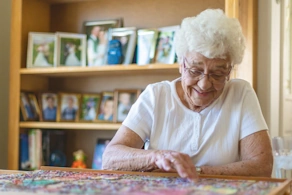Caregiver Burnout: How To Spot It And What You Can Do
Caregiving can be rewarding, allowing you to provide for another person and help them find ways to thrive. It also comes with challenges that can weigh heavily on a caregiver and may even lead to caregiver burnout, a state of emotional, physical, and mental exhaustion. This is a significant concern for many caregivers in Canada as they take on more responsibility in order to provide best for those in their care. Recognizing and addressing burnout is important for maintaining your well-being and the quality of care you provide, so stay aware of the signs and causes of caregiver burnout so you can find ways to recover.
Life Assure Product Quiz
Take our 30 second quiz and discover which Life Assure medical alert device is the right fit for you or a loved ones.
Life Assure Product Quiz
Take our 30 second quiz and discover which Life Assure medical alert device is the right fit for you or a loved ones.
What Is Caregiver Burnout?
Caregiver burnout is a state of ongoing stress and fatigue that affects those who care for others, often those without enough support or breaks. This condition can significantly impact a caregiver's health. For those looking after seniors, burnout can show up as emotional, physical, and mental exhaustion, making it tough to continue providing quality care.
Emotionally, caregivers might feel frustrated, sad, or helpless, which can lead to anxiety or depression if not addressed. Physically, the demands of caregiving can cause fatigue, sleep problems, and a weakened immune system, increasing the risk of illness. Mentally, the constant pressure can reduce concentration and memory, leaving caregivers feeling overwhelmed.
It's extremely important to recognize caregiver burnout, especially with the increasing needs of Canada's aging population. Caregivers experiencing burnout provide lower-quality care to those they're responsible for, and could even endanger seniors or themselves due to fatigue, impaired judgment, or any number of other problems.
Recognizing The Signs Of Caregiver Burnout
Spotting caregiver burnout early can make a big difference. It can be challenging to distinguish between everyday stress and burnout, but certain indicators can help. Look out for signs like constant tiredness, irritability, and changes in sleep habits. Caregivers may lose interest in activities they once enjoyed or feel resentment toward those they care for. Physically, stress can lead to frequent headaches or stomach issues.
In everyday life, these symptoms might show up as forgetfulness, neglecting personal duties, or avoiding social interactions. Social withdrawal is also common, with caregivers avoiding interactions with others beyond their duties due to exhaustion or lack of time. Early recognition allows caregivers to seek help and take steps to protect their health and well-being.
Causes Of Caregiver Burnout
Caregiver burnout often stems from emotional stress, such as the ongoing worry about a loved one's health. It can be difficult to cope with problems like this, especially the feelings of anxiety and helplessness surrounding a fear of being unable to do enough. If left unchecked, this may escalate into burnout.
The physical demands of caregiving also play a significant role in causing burnout. Tasks such as lifting, bathing, and assisting with mobility can be physically taxing and lead to fatigue. Over time, these physical demands can take a toll on a caregiver's body, increasing the likelihood of burnout particularly if there isn't enough time to rest and recover.
A lack of support could also factor into things. Many caregivers feel isolated, as they might not have adequate assistance from family or community resources. This isolation can be particularly challenging in Canada, where caregivers may face additional hurdles like navigating complex healthcare systems or managing long wait times for services. These challenges can exacerbate feelings of being overwhelmed and contribute to burnout if not addressed promptly.
Preventing Caregiver Burnout
Preventing burnout is an important part of work as a caregiver, both for your own sake and those in your care. Proactive stress management helps a lot, as does maintaining a healthy work-life balance. Much of burnout comes from the inability to relax and leaving stressors to fester without attending to them, so addressing problems like this head on does a lot to prevent burning out.
Caregivers should prioritize their health by taking regular breaks and setting boundaries to ensure personal time. This might mean engaging in hobbies, exercising, or simply relaxing. Whatever self-care means to you is what you should do.
It's also necessary to have a good support network by your side. Connecting with family, friends, and local support groups can provide emotional relief and practical help. Community resources, such as respite care services, offer temporary relief from caregiving duties, allowing caregivers to recharge.
Self-Care Tips For Caregivers
Incorporating self-care into daily routines can help manage stress. Simple practices like deep breathing, meditation, or yoga can help you let go of your worries for a time. Regular breaks are non-negotiable, even if it's just a short walk or a few minutes of quiet reflection.
Pursuing personal interests and maintaining social connections can also ease stress. Caregivers should focus on their physical health by eating well, staying hydrated, and getting enough sleep to support their overall well-being.
Building A Support Network
A strong support network can lighten the caregiving load. Caregivers should reach out to family and friends for help and emotional support. Joining support groups, whether in-person or online, can provide a sense of community and shared understanding.
Professional services, like counseling or therapy, offer valuable insights and coping strategies you can take with you when times get tough. In Canada, organizations such as the Canadian Caregiver Coalition provide resources and support for caregivers across the country.
Managing Caregiver Burnout
If burnout occurs, the sooner you can handle it, the better. Professional help, like therapy or counseling, can equip caregivers with tools to manage stress and emotional challenges. Open communication with family and healthcare providers helps everyone understand the caregiver's needs and limits, as well as what they need to overcome burnout.
Caregivers shouldn't hesitate to ask for help. Arranging for respite care or delegating tasks to family members can prevent further burnout and improve the quality of care provided.
Resources For Canadian Caregivers
Canada offers various resources to support caregivers as they work. The Canadian Caregiver Coalition and provincial organizations provide information, support groups, and advocacy that can prove invaluable at times. Government programs like the Canada Caregiver Credit offer financial assistance to those who qualify.
Local health authorities often have programs and services designed to support caregivers, such as respite care and educational workshops. It's important for caregivers to explore these resources and reach out for assistance when needed.
Conclusion
It's necessary to recognize and address caregiver burnout for the health and well-being of both caregivers and those they care for. There are many resources in Canada for caregivers to help them overcome burnout. By prioritizing self-care and building a strong support system, caregivers can continue to provide quality care to seniors while preserving their own health and happiness.











 Get Help With The Push Of A Button
Get Help With The Push Of A Button














